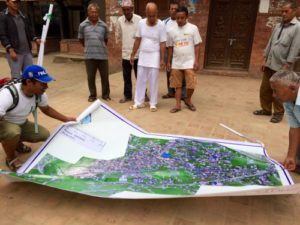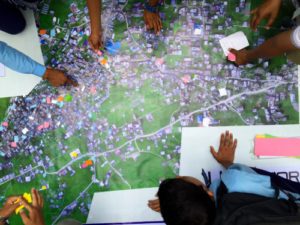
“Digital Humanitarian” and founder of the Humanitarian UAV Network Patrick Meier is using drone technology to its utmost potential for humanitarian aid, most recently utilizing aerial imaging to create amazing 3D maps of the areas most damaged by the Ghorka Earthquake in Nepal. The Ghorka Earthquake has claimed over 9,000 lives, and left hundreds of thousands homeless.
Working with drone manufacturer DJI, UAV processing software experts Pix4D, Chinese smartphone manufacturer Smartisan, Kathmandu Living Labs and the Kathmandu University, Meier led a team to create the Kathmandu Flying Lab, designed to bring drone technology to the communities hardest hit by the earthquake.

The team trained 28 engineering students from Kathmandu University to fly drones and use the Pix4D mapping software. They then took the drones into the community in the village of Panga, one of those who suffered the most damage. After using the drones to create 3D maps of the village, the team printed the maps on waterproof banners and laid them out so that community members could contribute their own knowledge to the map. Using sticky notes and color-coded tapes, village residents were able to add data about the location of debris, drinking water, and temporary shelters.
The maps will help the community members and aid organizations to recognize where the damage was greatest, helping them to rebuild faster and better; the students trained in drone technology can take their skills into the workplace and may be able to develop new businesses around the use of drones.
“The use of drones and drone-imagery is creating new professionals and giving others access to maps and data they didn’t have before,” says Krista Montgomery, a team member from Pix4D. “Because of the training offered by spaces like the Flying Labs, people who might otherwise not be involved in the UAV industry are seeing its potential to change the way they work. ..they are helping democratize the use of drones for mapping and that’s what Pix4D wants to see happen as well.”
The Kathmandu Flying Lab is just the first of many that Meier has planned. Flying Labs and the Humanitarian UAV Network are just some of Meier’s newest projects; most recently, he served as Director of Social Innovation at QCRI in Qatar, where he was tasked with developing Next Generation Humanitarian Technologies powered by crowdsourcing and artificial intelligence. Meier sits on the Innovation Team of the UN Secretary-General’s World Humanitarian Summit (WHS) and co-founded the Digital Humanitarian Network (DHN) with the United Nations.
Meier believes that drone technology can not only serve to aid in disaster relief, but can stimulate the economies of poor countries. “We’ve been approached by local partners in Indonesia, Liberia, Chile and Haiti to co-create Flying Labs with them,” Meier told DroneLife. “These labs…have a strong social entrepreneurship focus. We’re using these labs to provide hands-on training to our local partners so they can use aerial robotics in their projects and also offer UAVs-as-a-service in their own countries. In other words, we’re looking to catalyze a local industry around this emerging technology by spinning off local UAV businesses. So this is not only about the impact of the technology on social good projects; but also about creating jobs and new livelihoods in low-income countries.”
You can learn more about the Humanitarian UAV Network’s Nepal project in this short video documentary, or in Meier’s new book, Digital Humanitarians.

Miriam McNabb is the Editor-in-Chief of DRONELIFE and CEO of JobForDrones, a professional drone services marketplace, and a fascinated observer of the emerging drone industry and the regulatory environment for drones. Miriam has penned over 3,000 articles focused on the commercial drone space and is an international speaker and recognized figure in the industry. Miriam has a degree from the University of Chicago and over 20 years of experience in high tech sales and marketing for new technologies.
For drone industry consulting or writing, Email Miriam.
TWITTER:@spaldingbarker
Subscribe to DroneLife here.







[…] DJI‘s Romeo Durscher (one of the originators of the “Drones for Good” movement) and digital humanitarian Patrick Meier were among those […]